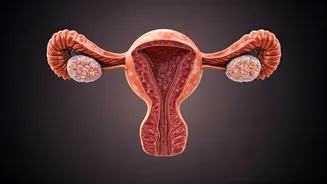The Blood Sugar Alarm
High blood sugar, also known as hyperglycemia, is a critical health indicator, similar to an internal alarm system. It warns that the body isn't processing
sugar correctly. This issue is often associated with diabetes, where the body struggles to produce or use insulin, a hormone vital for converting glucose (sugar) into energy. When blood glucose remains elevated throughout the day, it can lead to a variety of health complications. Early detection of high blood sugar is essential for preventing long-term damage and ensuring optimal health. Regular monitoring of blood glucose and immediate medical care are key to controlling this. This involves lifestyle modifications and, in certain instances, medical interventions to stabilize blood sugar levels and maintain overall well-being. Understanding the signals of high blood sugar empowers individuals to take control of their health.
Causes and Symptoms
Understanding the root causes and symptoms of high blood sugar is vital for effective management. Several factors contribute to this, including diet, physical activity, and genetics. Consuming a diet rich in carbohydrates without sufficient insulin production can quickly elevate glucose levels. Lack of exercise can also play a part since physical activity aids the body in using glucose for energy. Moreover, genetics can make individuals more prone to insulin resistance or reduced insulin production. Symptoms vary but commonly include increased thirst, frequent urination, blurred vision, fatigue, and slow-healing sores. Recognizing these symptoms is the first step toward seeking medical advice and possibly diagnosing diabetes or prediabetes. Early detection allows for timely intervention, helping to prevent or delay serious health problems associated with chronic high blood sugar. Medical professionals often recommend a combination of dietary adjustments, exercise regimens, and sometimes medication to help control blood sugar levels.
Effective Management Strategies
Managing high blood sugar involves adopting lifestyle changes and often using medical treatments to keep glucose levels stable. Diet plays a crucial role, with a focus on balanced meals that include whole grains, lean proteins, and plenty of vegetables. Controlling portion sizes and limiting the intake of sugary drinks and processed foods are essential for maintaining healthy glucose levels. Regular physical activity helps the body use insulin more effectively, reducing blood sugar. Exercise also helps to maintain a healthy weight, which is important for blood sugar control. For those with diabetes, medications, like insulin or oral drugs, can be prescribed to help the body process glucose. Blood glucose monitoring is essential to assess the effectiveness of these interventions. Regular check-ups with healthcare professionals are crucial for adjusting treatment plans and addressing any potential health complications. Staying informed about the latest advancements in diabetes management can further support individuals in effectively managing their blood sugar levels.
Risks and Complications
Consistently elevated blood sugar levels significantly increase the risk of developing severe health complications. Over time, this condition can damage various organs, including the eyes, kidneys, nerves, and heart. Prolonged hyperglycemia can lead to diabetic retinopathy, which affects vision and may cause blindness. Kidney damage, known as nephropathy, can lead to kidney failure. Nerve damage, or neuropathy, can cause pain, numbness, and loss of function in the extremities. Furthermore, high blood sugar can damage blood vessels, increasing the risk of cardiovascular diseases like heart disease and stroke. Early detection and appropriate management are essential to mitigating these risks. Regular monitoring of blood sugar, combined with lifestyle changes and medical interventions, can significantly reduce the likelihood of developing these complications. Consistent management promotes better health and improved quality of life for individuals affected by high blood sugar.
Seeking Timely Help
Recognizing the need for timely medical intervention is vital for managing high blood sugar effectively. If individuals experience symptoms such as excessive thirst, frequent urination, blurred vision, or fatigue, they should seek immediate medical attention. Early diagnosis allows healthcare providers to initiate appropriate treatment and prevent severe health issues. A healthcare professional can conduct blood tests to measure glucose levels and assess overall health. Based on the results, a personalized treatment plan may be developed. This plan could include dietary adjustments, exercise recommendations, medication, and regular monitoring. Regular check-ups with doctors and other healthcare professionals are essential to monitor progress and adjust treatment as needed. Seeking help promptly can help prevent complications and improve the long-term health of those affected by high blood sugar, leading to a better quality of life.












